Abstract
This study is aimed at determining whether written literacy in the age of Internet communications still matters. The authors undertake an attempt to analyse the influence the Internet has on the language culture and total literacy of its users. Literacy observed from the point of its notion and its main criteria is thoroughly studied in the works of domestic and foreign linguists. Literacy in terms of writing serves here as the basics for effective communication between the sender and the recipient of any message. Theoretical analysis shows that even if to observe literacy as an inherent human right or even choice, functional literacy still remains essential for an individual’s successful functioning as a part of the modern society. The authors speculate on whether literacy is an integral part of human competence and whether an illiterate person can be considered a competent professional. The practical aspect of the issue under the research is studied with the help of the questionnaire offered to various categories of native Russian speakers. The context of the analysed questionnaire and the research undertaken by the authors of the paper demonstrate the tendency of the Internet users not to follow the basic standards of spelling, punctuation and grammar when addressing the resources of the world wide web. One of the goals is to identify and to study the mistakes occurring in the written speech in the age of Internet communications.
Keywords: Written speechwritten literacyage of Internet communicationscompetencieswriting skillsilliteracy
Introduction
Written literacy in the age of Internet communications is important as the need for effective written communication is growing steadily in proportion to the development of scientific, technical, economic, commercial and cultural ties, the desire to establish and boost cooperation in the era of civilization development ( Bogdanovich & Rudnitskaya, 2016). It is believed that being literate in the age of Internet is easy. Yes, the Internet is convenient, fast and not complicated. Why not use the instantly accessible results of the search engines and make life less complicated? But what if their data is probably unreliable, sometimes presented in the illiterate and irresponsible manner?
Nowadays it has become popular to discuss literacy of expressing thoughts both in oral and written speech, which is fundamental for successful communication between the sender and receiver of the text. Even the period of 2003-2012 was declared by the United Nations as the decade of literacy, which proved that international society recognised literacy as the human right, which needs to be supported and protected ( Kontrimovich & Payunena, 2013). In this regard, the researches conduct this study to diagnose the issue of written literacy of Internet users and to decide whether it is their right, choice or just a fact of nowadays reality.
Problem Statement
The level of overall literacy of Internet users has drastically changed from the start of the Internet era. There are mistakes or language mistreatments, which irritate people when facing them in other people’s speech, texts or messages; To take the control over the changes, it is of importance to see how Internet users understand the deviations themselves, whether they see or experience any difficulty or problem of communication.
Research Questions
To achieve the main goal of the study the authors of the research undertake an attempt to find answers to the following questions:
How do Internet users perceive their own literacy and the literacy of their correspondents in written Internet communications?
What types of errors are commonly found in Internet communications?
Purpose of the Study
Internet-mediated communications have made the life of humanity different. Along with making things easier, providing access to tons of information data and speeding up the tempo of our life, it also brought changes to the manner of communication.
The purpose of the study is to observe how Internet users feel about the nowadays level of literacy, whether it is staying the same or decreasing.
Research Methods
The multifaceted nature of the research presupposed the collection of the data and its analysis with the help of the combination of the research methods, among which there are qualitative and quantitative research methods (the method of data collection, the method of data analysis). The tool used is a questionnaire, aimed to survey numbers of participants about their opinions on the issue under consideration and to make conclusions based on the questionnaire numerical data.
The research involved
32 2-year full-time female students of Herzen State Pedagogical University,
54 other respondents (people of various age and occupations). 94% of them are female (Figure
01 ).
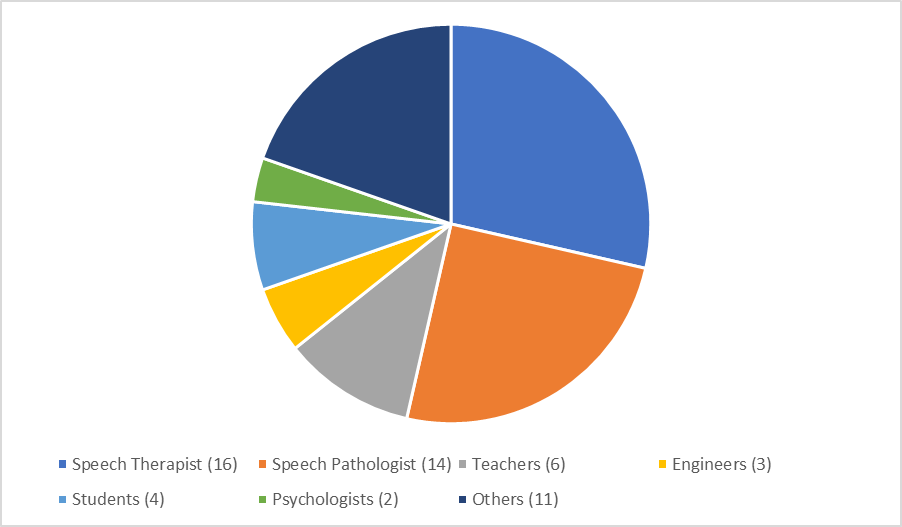
The guiding principle of the conducted research was the principle according to which personal and professional sets of knowledge were linked. This approach made it possible to identify the main types of mistakes occurring when analysing written communication in the Internet.
Findings
Written speech is an integrate part of communication which helps people transform their thoughts or intentions into the language form. Internet-mediated communication tends to result in new and different forms of creativity in the language.
As we see it, traditional writing manner acquires the dynamic nature of the Internet and its communicative style of speech characteristic of the oral speech. Internet users interact with the help of a variety of devices, messengers, applications, etc. On the one hand, it helps them to minimize their time expenses. On the other hand, it results in language modifications made by Internet users. Most often we come across raw forms of communication, presented by acronyms, short forms, stylistic variations or even deviations, etc.
Unfortunately, Internet users also tend to demonstrate:
the growth in number of written errors,
the lack of ability to communicate,
no or insufficient education,
the lack of knowledge or ignorance in a specific subject.
Illiteracy of the Internet generation has become of interest for many researchers ( Ahmed, 2018; Assaggaf & Bamahra, 2016; Bouziane, 2017; Kanyakorn, Jiraporn, & Rattaneekorn, 2017; Mohammad & Hazarika, 2016), who suggest their own understanding of this notion. Some say that illiteracy should be understood as one of the major components of human competence no matter what professional field an individual belongs to. If we consider the notion of literacy from different angles, we can come across a number of definitions which mostly specify that literacy is “1. The ability to read and write. 2. Lack of grammatical and stylistic errors, compliance with the norms of the literary language. 3. Possession of the necessary knowledge, information in a specific sphere” ( Efremova, 2000, p. 53). Aleksandrova, Dobrotina, Gosteva, and Vasilevyh ( 2017) believe that to be functionally literate means to possess both communicative and cognitive skills. Language component of functional literacy is a must-be as language is a knowledge about the world perceived through the prism of a culture. In other words, language literacy is the ability to use the most effective and suitable means of the language and to comprehend the information from different sources.
To focus is on how Internet users evaluate their own and overall level of literacy, we have surveyed the total number of 86 respondents. The questionnaire contains 20 questions aimed at finding out what respondents think of their own literacy and the literacy of their correspondents in Internet communication. Among the questions are those about the background of the respondents, their achievements in the sphere of language study, their level of comprehension of the Internet illiteracy, etc.
Overall analysis of the questionnaire results demonstrates that the respondents do pay attention to the changes in the language caused by the development of modern technologies.
One of the questionnaire questions is about whether people make more or less mistakes when typing or writing by hand. Both the groups of respondents state that in this case the types of mistakes differ. When writing by hand, for instance, they make more spelling or punctuation mistakes. When typing the text, the respondents make more typing mistakes.
16% of the respondents from the group of students write in the same way, 31 % of the representatives of the same group make less mistakes when typing. 53% of them make less mistakes when they write by hand (see Figure
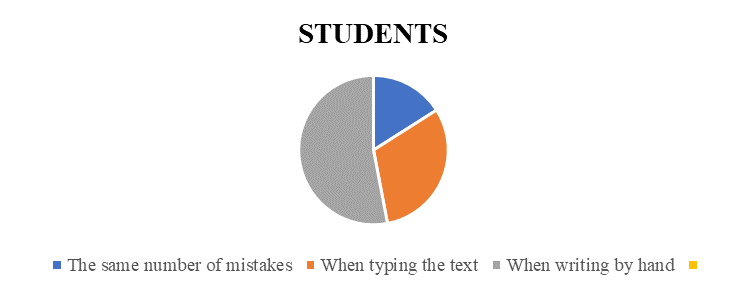
20% of the respondents from the group of other respondents write in the same way, 30 % of the representatives of the same group make less mistakes when typing. 33% of them make less mistakes when they write by hand (see Figure
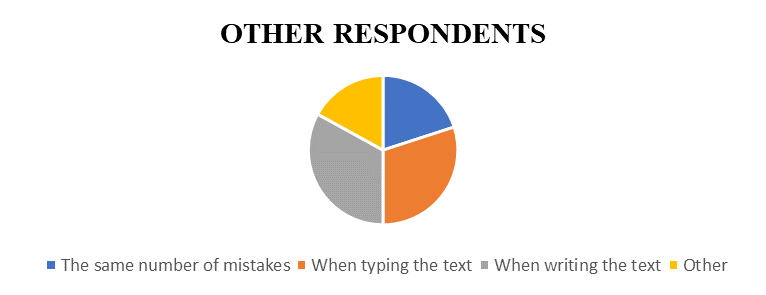
The respondents also dwell upon whether built-in text editors promote literacy or contribute to its decrease. 19 out of 32 students, 24 people out of 54 other respondents find text correctors of use, while the other participants believe that automatic text editors and text correctors sometimes fail to see the errors and make people think less about the correctness of their speech.
The answer to the question of what mistakes the respondents consider to be rude or unacceptable demonstrates that literacy still matters for people. The informants cannot accept the raw violation of grammar rules (as it can lead to complete misunderstanding of the conveyed message), ignorance of spelling and punctuation rules.
Mistakes or errors which occur in written communication in the Internet might be the result of functional illiteracy, the challenges of which cut across age, gender, educational background and other characteristics of the Internet users. However, initially errors were understood as an element of speech activity. Later, with the development of science, the main emphasis was placed on the causes of errors and the mechanisms of their formation. Nowadays, errors are considered to be a tool for achieving correctness, normativity and improving the culture of speech.
Here we can’t but agree with Egorov ( 1953), who mentions that “analysis of errors introduces us to the laboratory of human activity, helps to reveal the driving forces of the process of its formation” (p.132). Error analysis suggested by Corder ( 1974) in its turn includes collection of errors, identification of errors, description of errors, explanation of errors, evaluation of errors. Errors based on various mechanisms of their generation are reduced to errors of visual perception, errors of understanding, speech errors, errors caused by deviations from the temporal norms necessary for correct pronunciation, errors of visual-motor inadequacy, dialect errors and undifferentiated errors, i.e. mistakes whose nature is not clarified (p.140).
In the work of Zeitlin ( 2020) speech errors are understood as any deviations from the existing language norms that occur in morphology, syntax, vocabulary, and phraseology. The researcher identifies systemic, vernacular, and compositional causes as the main causes of speech errors.
In spite of the fact that the problem of both written and oral speech errors remains on the periphery of research undertaken by Russian linguists, every scientist involved in speech activity still faces some type of deviation.
Researchers from all over the world ( Eliseeva, 2015; Kongkaew & Cedar, 2018; Zafar, 2016, etc.) recognise the common errors made by Internet users which contradict the norms of the language, among which are
additions,
distortions,
double markings,
misspelling,
omissions,
subject-verb disagreement,
wrong punctuation,
wrong word choice,
wrong word formations, etc.
Answering the question whether overall literacy decreases over time, most of the respondents speak about the level of literacy in general, without dividing it into their personal and those around them. The majority of the respondents do notice that the level literacy is decreasing (Figure
low literacy requirement for correspondence on the Internet,
speed of communication,
lack of control over what is said and how it is said or written,
lack of ongoing practice of writing, reading good quality literature,
ignorance of grammar rules, rules of spelling, punctuation, word formation, word usage, etc.,
the impact of the Internet oriented on entertaining rather than educating its users,
usage of voice mails, voice messages, where people do not need to pay attention to literacy at all,
wide usage of auto-correctors, which make people ignore the necessity to edit their messages or texts, etc.
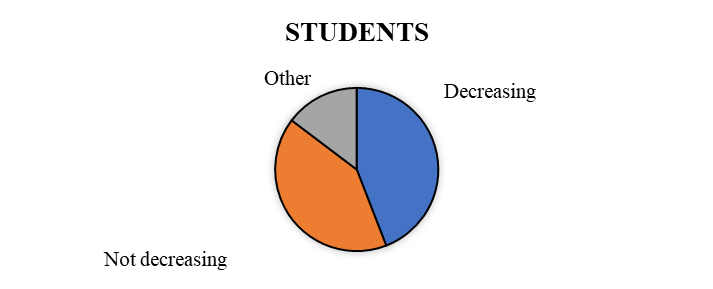
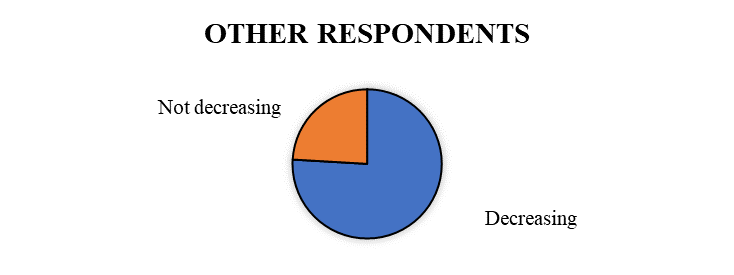
Conclusion
The research resulted in identifying major types of errors made by Internet users in the process of written communication. The questionnaire helped to understand that though people make mistakes themselves in their written speech, they hardly stand when mistakes are made by others.
The results obtained also indicate the need for the development of critical thinking and the communicative competence of Internet users as well as acquiring of extra-linguistic knowledge. The role of writing is huge especially in terms of its positive influence on the intellectual development of the individual. The perspective of further research may touch upon the identification, analysis, classification of errors that occur at the stage of generating and comprehending the text.
Acknowledgments
The research is performed under the grant 19-012-00293 Lexical Development of Bilingual Children of the Young Age.
References
- Ahmed, A. (2018). Assessment of EFL Writing in Some Arab World University Contexts: Issues and Challenges. In: Ahmed A., Abouabdelkader H. (eds) Assessing EFL Writing in the 21st Century Arab World. Palgrave Macmillan, Cham.
- Aleksandrova, O. M., Dobrotina, I. N., Gosteva, Yu. N., & Vasilevyh, I. P. (2017). Language Literacy in Composition Integrative Components Functional Literacy. Text of the Culture and the Culture of text. (pp. 349-354) Saint-Petersburg. Retrieved from https://elibrary.ru/download/elibrary_24040995_58827035.pdf
- Assaggaf, H., & Bamahra, Y. (2016). The effects of portfolio use in teaching report writing: EFL students’ perspective. International Journal of Applied Linguistics & English Literature, 5(3), 26–34.
- Bogdanovich, G. Yu., & Rudnitskaya, L. I. (2016). Linguacultural Situation: Verbal and Written Communication of Native Speakers. Intercultural Communications. Retrieved from https://elibrary.ru/download/elibrary_28326312_13674600.pdf
- Bouziane, A. (2017). Why Should the Assessment of Literacy in Morocco Be Revisited?. In Evaluation in foreign language education in the Middle East and North Africa (pp. 305-314). Springer, Cham.
- Corder, S. P. (1974). Error analysis. The Edinburgh course in applied linguistics, 3, 122-131.
- Efremova, T. F. (2000). New dictionary of the Russian language. Explanatory-derivational. Moscow: Russky yazyk.
- Egorov, T. G. (1953). Psychology of Mastering Reading Skills / T.G. Egorov. - M.: KARO.
- Eliseeva, M. B. (2015). Literacy in the Age of Internet communications. Russian Language at School. Our Language. №7. Moscow.
- Kanyakorn, S., Jiraporn, L., & Rattaneekorn, P. (2017). An Analysis of Errors in Written English Sentences: A Case Study of Thai EFL Students. English Language Teaching, 10(3). Retrieved from http:// dx.doi.org/10.5539/let.v10n3p101
- Kongkaew, S., & Cedar, P. (2018). An Analysis of Errors in Online English Writing made by Thai EFL Authors. International Journal of Applied Linguistics and English Literature, 7(6), 86-96. Retrieved from http://dx.doi.org/10.7575/aiac.ijalel.v.7n.6p.86
- Kontrimovich, A. A., & Payunena, M. V. (2013). Developing Functional Literacy in Teaching a Foreign Language: the Empiric Findings. Bulletin of Baikal State University of Economics and Law.
- Mohammad, T., & Hazarika, Z. (2016). Difficulties of learning EFL in KSA: Writing skills in context. International Journal of English Linguistics, 6(3). https://doi.org/10.5539/ijel.v6n3p105
- Zafar, A. (2016). Error Analysis: A Tool to Improve English Skills of Undergraduate Students. Procedia-Social and Behavioral Science, 217, 697-705. https://doi.org/10.1016/j.sbspro.2016.02.122
- Zeitlin, S. N. (2020). Speech Errors and their Prevention. - SPb.:URSS.
Copyright information

This work is licensed under a Creative Commons Attribution-NonCommercial-NoDerivatives 4.0 International License.
About this article
Publication Date
03 August 2020
Article Doi
eBook ISBN
978-1-80296-085-3
Publisher
European Publisher
Volume
86
Print ISBN (optional)
-
Edition Number
1st Edition
Pages
1-1623
Subjects
Sociolinguistics, linguistics, semantics, discourse analysis, translation, interpretation
Cite this article as:
Eliseeva, M. B., Schekleina, V. N., Pestova, M. S., & Khodenkova, N. I. (2020). Written Literacy In The Age Of Internet Communications. In N. L. Amiryanovna (Ed.), Word, Utterance, Text: Cognitive, Pragmatic and Cultural Aspects, vol 86. European Proceedings of Social and Behavioural Sciences (pp. 411-418). European Publisher. https://doi.org/10.15405/epsbs.2020.08.48

